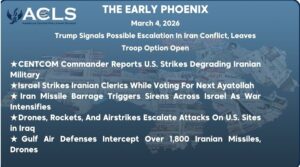★ ISRAEL
-
Gunman Kills Two Israeli Diplomats Outside Washington, DC Jewish Museum Event
Two Israeli embassy staff were fatally shot outside Washington’s Capital Jewish Museum during a Young Diplomats Reception hosted by the American Jewish Committee. The suspect, Elias Rodriguez, reportedly shouted “Free Palestine” upon arrest. The FBI’s Joint Terrorism Task Force is investigating. The victims were an engaged couple, remembered by Rabbi Levi Shemtov as synagogue attendees.
-
High Court Overturns Shin Bet Chief’s Firing, Citing PM Conflict
Israel’s High Court ruled Prime Minister Netanyahu’s dismissal of Shin Bet head Ronen Bar was unlawful, citing a conflict of interest due to probes involving Netanyahu’s aides. The court found no valid justification or due process, warning that it compromised the agency’s independence. Despite the ruling, Netanyahu vowed to appoint a new chief, rejecting judicial oversight.
-
Netanyahu Ties War’s End to Trump’s Gaza Aid and Relocation Plan
Prime Minister Netanyahu set implementing President Trump’s Gaza aid and relocation plan as a condition to end the war, declaring Hamas must be defeated, Gaza disarmed, and all hostages returned. He dismissed European pressure, vowed Israel’s security goals wouldn’t be compromised, and affirmed US coordination. Netanyahu also denied claims of a rift with Trump, endorsing further Abraham Accords normalization.
-
Israeli Troops Fire Near Diplomats in Jenin, Global Condemnation Follows
Israeli troops fired warning shots near diplomats from 22 countries touring Jenin, prompting international outrage and diplomatic summonses. Videos showed officials fleeing as soldiers fired near a blocked gate. No injuries were reported. Israel blamed the incident on the group straying from a pre-approved route, but the EU, France, Germany, and others demanded investigations and accountability.
-
Israel Clears UN Aid Trucks While Escalation Intensifies Across Gaza
Israel allowed 100 UN aid trucks carrying food and medicine into Gaza via Kerem Shalom, ensuring Hamas does not access supplies. However, the UN cited insecurity and looting as reasons for delayed aid distribution. Meanwhile, Gaza militants fired rockets twice at southern Israel, prompting Israeli warnings of retaliation and calls for evacuations in northern Gaza. Local Gaza medical sources claimed that Israeli attacks killed 93 Palestinians in the past 24 hours, targeting a shelter in Deir al-Balah, residential areas, and al-Awda Hospital.
============
★ IRAN
-
Pezeshkian Calls Trump a Thief, FM Dares Israeli Strike
Iranian President Masoud Pezeshkian called President Trump “the biggest thief,” rejecting U.S. corruption accusations and defending Raisi’s family as modest during a May 21 speech to parliament. He dismissed American claims that Iran steals national wealth to fund terrorism, while Foreign Minister Abbas Araghchi told Asharq TV that “no one dares to attack Iran,” citing the Islamic Republic’s defensive capabilities. Araghchi warned that uranium enrichment remains non-negotiable and condemned U.S. threats as ineffective. He also rejected European talk of restoring UN sanctions, calling it irrational and illegal. He added that the U.S. turned to negotiations only after its sanctions failed, saying Washington became “disappointed” when promised “crippling” measures did not succeed. Iran’s armed forces chief added that any aggression against Iranian territory would incur heavy costs and deliver no benefit to adversaries. Despite this rhetoric, however, the fifth round of talks with the U.S. is set to begin this Friday, May 23.
-
Iran Accuses Israel, U.S., and Türkiye of Occupying Syria
Iran’s Deputy Foreign Minister Mohammad Reza Raouf Sheibani claimed Syria is under occupation by Israel, the U.S., and Türkiye and accused Israel of pursuing a “Nile-to-Euphrates” expansion plan. At the Tehran Dialogue Forum, he warned of foreign interference blocking Syrian stability and stressed Iran’s support for political unity and national dialogue in Syria without external intervention.
-
Iran Admits Recruiting Israeli Youth for Espionage on Former PM Bennett
Iranian state TV revealed that Tehran recruited an 18-year-old Israeli via a Telegram bot to spy on ex-Prime Minister Naftali Bennett. The youth filmed inside a hospital where Bennett was treated, receiving instructions from an Iranian officer. Israel’s Shin Bet recently arrested others linked to Iranian intelligence, marking a rise in Iran’s digital espionage targeting Israeli officials.
=============
★SYRIA
-
Barrack to Hold Dual Post Overseeing Turkiye and Syria
The United States has appointed Thomas Barrack, its current ambassador to Turkiye and longtime advisor to President Donald Trump, as special envoy for Syria. Barrack will continue in his ambassadorial role while assuming this new position. He has already engaged with key regional officials, including the foreign ministers of Turkiye and Syria, and recently participated in a U.S.–Turkiye meeting in Washington focused on Syria. His new role is intended to facilitate humanitarian aid, support Syria’s interim government, and encourage regional diplomacy, including efforts to improve Syrian-Israeli relations.
-
EU Presses Syria’s New Government on Refugee Return Coordination
EU foreign policy chief Kaya Kallas informed her Syrian counterpart, Asaad al-Shaibani, of the need to focus on planning refugee return in coordination with Turkiye, Jordan, Lebanon, and international bodies during a phone call discussing the EU’s recent decision to lift sanctions on Syria. Al-Shaibani welcomed the move as a step toward reconstruction. Both sides agreed to continue political and economic coordination, positioning the new government as key to resolving the refugee crisis. In other related news, the U.K. expressed its desire for a clear timeline outlining next steps in Syria’s political transition during yesterday’s United Nations Security Council session.
-
Foreign Instructors Kill Two in Attack on Russian Base
Two foreign fighters serving as military instructors at the new Syrian government’s Naval College attacked the Russian base at Hemeimeem Airport, killing two soldiers. It remains unclear whether the victims were Russian or Syrian contractors.
-
Sweida Governor Held Hostage Over Convicted Thief’s Release
Armed men stormed the Sweida governorate building, brandished weapons at Governor Mustafa al-Bakour, and forced the release of convicted car thief Ragheb Qarqout. The group, led by Fadi Nasr, locked the building and threatened staff. Druze factions intervened, evacuating the governor. The Council of the Mind then authorized local factions to support police efforts to restore order, citing a May 1 agreement with Druze leaders aimed at reinforcing law enforcement and rejecting partition or sectarianism.
============
★ TÜRKIYE
- Israel and Türkiye Set Up Hotline Mediated by Azerbaijan to Prevent Syria Clashes
Israel and Türkiye activated a 24/7 military hotline—mediated by Azerbaijan—to prevent clashes in post-Assad Syria. Israel, which controls key southern zones and airspace, rejects any Turkish radar or air defense presence near Palmyra, citing threats to its operational secrecy. While a temporary arrangement permits Turkish ground forces north of Palmyra, Israel has drawn a red line against Turkish S-400 deployment. Talks are ongoing, with a fifth deconfliction round scheduled. Türkiye, backing the new Islamist-led Syrian government, insists these are not normalization efforts but military coordination to avoid proxy warfare. Israel has conducted airstrikes on planned Turkish positions, increasing tensions.
============
★ LEBANON
-
Lebanese-Palestinian Agreement to End Attacks Against Israel from Lebanese Territory
Lebanon and the Palestinian Authority have agreed to prevent any attacks on Israel launched from Lebanese territory and to remove unauthorized weapons. The announcement followed President Mahmoud Abbas’s first visit to Lebanon in seven years and was made jointly with President Joseph Aoun. The move aims to reinforce state authority in Lebanon’s south. In response, Hamas affirmed support for Lebanese stability but insisted that decisions on disarmament must be made through inclusive dialogue with Palestinian factions. While regional shifts, including declining Iranian and Hezbollah backing, may pressure Hamas into compliance, experts caution that hasty disarmament could trigger instability, reviving memories of Lebanon’s civil strife linked to Palestinian arms.
-
Israel Conducts Drone Strikes Killing Three in Southern Lebanon Towns
Israeli drones struck Ain Baal, Yater, and Aitaroun on Wednesday, killing three, including Ali Hassan Sweidan, who was clearing war debris. The IDF claimed that one victim, Hussein Nazih Barji, was a Hezbollah weapons expert. Despite the 2024 ceasefire, Israel continues near-daily attacks, with over 3,000 violations and 203 deaths reported since November.
============
★ IRAQ
-
Iraq’s PM Sudani to Run Under Country’s Largest Electoral Alliance
Iraqi Prime Minister Mohammed Shia al-Sudani will contest the November parliamentary elections under a new coalition, “Reconstruction and Development Alliance,” uniting major nationalist factions. The bloc includes groups like Furatain, National Contract, and Karbala Innovation. Former Deputy PM Baha al-Araji hinted at possible support from cleric Muqtada al-Sadr for Sudani’s second term.
-
U.S. Bill Reportedly Targets Top Iraqi Officials as Terror Sponsors
Political analyst Ahmed Al-Abyad revealed on X that amendments to the U.S. “Iraq Liberation from Iran Act” now designate Iraqi figures—including Nouri al-Maliki, Hadi al-Amiri, and judiciary chief Faiq Zaidan—as terrorists. The law also classifies all Iran-aligned militias, including the Popular Mobilization Forces, as terrorist groups. If passed in October, it may trigger sanctions, asset freezes, and arrest warrants.
-
Iraq Signs Major Oil and Energy Deal With Chinese Consortium
Iraq signed the South Basra Integrated Project deal with China’s Geo-Jade and local Hilal Al Basra, aiming to boost Tuba oilfield output from 20,000 to 100,000 bpd, build a 200,000 bpd refinery, and add petrochemical and fertilizer plants. The project includes 650 MW thermal and 400 MW solar power stations, with excess electricity feeding the national grid.
============
★YEMEN
-
Houthi Missile Intercepted Over Israel, One Civilian Injured During Evacuation
A missile launched from Yemen was intercepted over central Israel by the Arrow 3 defense system at 2:59 a.m. on Thursday, following air raid sirens that forced over a million residents into shelters. No direct impact occurred, but one individual was injured during the evacuation process. The missile attack came shortly after Israeli airstrikes targeted Houthi-controlled ports in Yemen under Operation Red Sunsets. In Riyadh, Yemeni presidential council chief Rashad al-Alimi rejected Houthi ceasefire gestures as tactical deception and called for their decisive military defeat. The U.S. reiterated its support for Yemen’s internationally recognized government and efforts to restore sovereignty and stability.
-
European Union Allocates €80 Million in Humanitarian Aid to Yemen
The European Commission announced €80 million in humanitarian aid for Yemen in 2025, reaffirming its commitment amid ongoing war, Houthi insurgency, and climate crises. The pledge coincided with the 7th international humanitarian meeting on Yemen, underscoring EU support for civilian relief and stability efforts.
============
★ GULF
-
U.S. Accepts $400M Jet Gift From Qatar for Trump’s Air Force One
The U.S. has accepted a $400 million Boeing 747 jet from Qatar to serve as President Trump’s new Air Force One. Defense Secretary Pete Hegseth approved the deal, with the Pentagon now planning costly security and tech upgrades. Critics warn of foreign influence and cite legal and ethical concerns, while Trump dismissed objections as “stupid.”
-
Saudi-Chinese Committee Discusses Enhanced Security Cooperation in Beijing
Saudi Deputy Interior Minister Prince Abdulaziz bin Mohammed bin Ayyaf and China’s Vice Minister of Public Security Xu Datong led the fifth Saudi-Chinese Security Committee meeting in Beijing, addressing bilateral security cooperation and joint initiatives. Officials from both sides emphasized trust-based coordination amid evolving global challenges, with high-level participation from government and security agencies.
============




